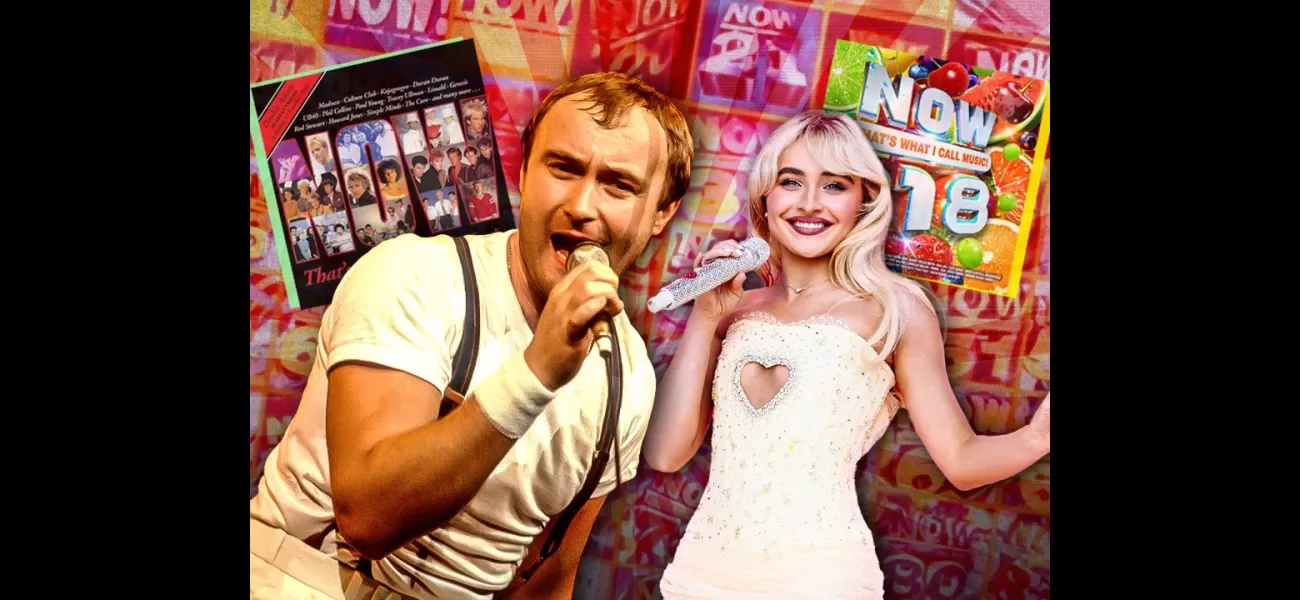Gen Z surprisingly embraces 'outdated' Now That's What I Call Music.
Exploring previously unknown music from the 80s and 90s.
July 28th 2024.

Gen Z, the generation born between the mid-1990s and early 2010s, has been making waves in the music industry with their newfound love for the Now music back catalogue. And honestly, it's a phenomenon that deserves recognition! Who would have thought that this iconic but 'archaic' brand, Now That's What I Call Music, would still hold such relevance and appeal to the younger generation, despite streaming becoming the primary way of consuming music in the 21st century?
But here we are, with over 200 million Now CDs sold since its inception decades ago, and an astonishingly enduring legacy. The question is, why are Gen Z kids so obsessed with it? Well, for starters, the latest edition, Now That's What I Call Music 118, is packed with tracks from younger artists like Benson Boone, Chappell Roan, Billie Eilish, and Sabrina Carpenter. And while they may be exploring the archives to discover hits from the 80s and 90s, they are also discovering 'new' music from those decades, which have become the two most popular 'old' decades among the younger crowd today.
It's not just the music itself that has caught their attention, but also the way in which Now compilations are curated. With platforms like TikTok introducing younger audiences to songs from previous decades through viral challenges and trends, it's no wonder that the Now brand has become a topic of interest among Gen Z. In fact, if you search for it on TikTok, you'll find countless videos from users creating funny and informative content about the brand.
One such fan is 18-year-old Damian Gandia, who has even dedicated his own YouTube channel to the Now brand. He may not have been born when his favorite Now album was released in the USA, but he considers it a 'total classic' thanks to the inclusion of tracks like Britney Spears' "Overprotected" and Nickelback's "How You Remind Me." Damian is an avid collector of Now CDs and firmly believes that there is still a need for the brand, despite the availability of endless playlists on streaming services. For him, the Now brand offers something unique in the way it collates tracks, and it has even been life-changing for him.
But it's not just the younger generation that is enamored with the Now brand. Jerry Cohen, the Chief Operating Officer for Now, has overseen the release of 175 Now albums in the US and has observed a loyal fan base that spans across different demographics, including Gen Z, millennials, and older listeners. James Dean, a 50-year-old from Manchester, has been a fan since receiving the first-ever Now album on cassette for Christmas in 1983 and recalls it being "the best thing since sliced bread." For him, it introduced him to iconic bands like Culture Club, The Cure, and The Human League, and even gave him a glimpse into LGBTQ+ culture.
And it seems that the teenagers of today are equally as dazzled by the Now anthology and compilation 'trend.' Eliza, 17, from Bournemouth, was first introduced to the series as a young child and still enjoys listening to her favorite albums today, despite the dominance of streaming services. For her, what makes the collections special is that there is always something for everyone, and she particularly loves the albums from the 80s, featuring artists like Madness and Duran Duran.
The Now brand has truly stood the test of time, and its enduring appeal among Gen Z is a testament to its iconic status in the music industry. It's not just about the music itself, but the way in which these compilations capture a moment in time and offer a unique listening experience. And as long as there are fans like Damian, Eliza, and James, the Now brand will continue to thrive and be recognized as a phenomenon in the music world.
There's a growing trend among Gen Z fans who are finding a newfound love for the Now music back catalogue. It's a phenomenon that has taken many by surprise, as the iconic Now That's What I Call Music brand was once considered old-fashioned and outdated. But despite the rise of streaming services in the 21st century, this compilation album remains a powerhouse in the music industry. And what's even more surprising is that it has captured the hearts of the younger generation who grew up with Spotify.
With over 200 million copies sold since its inception, the Now brand has an enduring legacy that continues to thrive. But why are Gen Z kids so obsessed with it? Well, despite the era of streaming, Now is still a major player in the music scene for those under 30. And with the recent release of Now That's What I Call Music 118, featuring tracks from up-and-coming artists like Benson Boone, Chappell Roan, Billie Eilish, and Sabrina Carpenter, it's no wonder that Gen Z is hooked.
But it's not just the latest edition that's capturing their attention. Gen Z is also delving into the Now archives, discovering the biggest hits from past decades. It's a perfect opportunity for them to explore "new" music from the 80s and 90s, which happen to be the most popular "old" decades among the younger crowd today.
For Gen Z, diving into the 90s music scene is like finding a treasure trove of sounds that have paved the way for the artists of today. And this newfound appreciation is influencing their music consumption, thanks to platforms like TikTok, which often feature viral challenges and trends that introduce younger audiences to songs from previous decades. Who knew TikTok could be good for something?
If you search for the Now brand on TikTok, you'll find tons of videos from creators who are passionate about the brand. American teenager Damian Gandia even has his own YouTube channel dedicated to it. At 18 years old, Damian wasn't even born when his favorite Now album was released in the USA in 2002, but he considers it a "total classic" because of tracks like Britney Spears' "Overprotected" and Nickelback's "How You Remind Me." Damian is such an avid collector that he believes there's still a need for the Now brand, despite the endless playlists available on streaming services. For him, the Now brand offers something unique in the way it curates tracks, and it has been a life-changing experience.
The latest edition of Now features a diverse range of artists, including Sabrina Carpenter. But the Now albums have a long history of featuring popular artists from different eras, like Phil Collins, who was a fixture on the albums during his heyday. And it's not just the younger generation that loves the Now brand. Chief Operating Officer Jerry Cohen, who has overseen the release of 175 Now albums in the US, says that the brand has a loyal fan base that spans across different demographics, including Gen Z kids like Damian, millennials, and older listeners.
One such listener is James Dean, a 50-year-old from Manchester who still remembers receiving the first-ever edition of Now That's What I Call Music for Christmas on cassette in 1983. He thought it was the best thing since sliced bread. "It introduced me to some of the most iconic bands that I have listened to all my life," he recalls. "Culture Club, The Cure, The Human League. Culture Club, in particular, gave me one of my first glimpses of LGBT culture and people, my people."
And it seems the teenagers of today are equally as dazzled by the Now anthology and compilation trend. Listening back to these sonic time capsules takes them back to a specific moment in time. It's like feeling the charts of whatever year they're listening to. Just ask Eliza, a 17-year-old from Bournemouth who was first introduced to the Now series as a young child. She still devours her favorite albums today, despite Spotify dominating the music scene in 2024.
"What I love about the collections is that there's always something for everyone on each album," she explains. "There's never one song on the albums that someone doesn't like." Her favorite Now album is from the 80s, featuring popular artists like Madness and Duran Duran. And it's not just about the music for Eliza. It's also about the memories and nostalgia that come with each track, making it a truly special experience.
But here we are, with over 200 million Now CDs sold since its inception decades ago, and an astonishingly enduring legacy. The question is, why are Gen Z kids so obsessed with it? Well, for starters, the latest edition, Now That's What I Call Music 118, is packed with tracks from younger artists like Benson Boone, Chappell Roan, Billie Eilish, and Sabrina Carpenter. And while they may be exploring the archives to discover hits from the 80s and 90s, they are also discovering 'new' music from those decades, which have become the two most popular 'old' decades among the younger crowd today.
It's not just the music itself that has caught their attention, but also the way in which Now compilations are curated. With platforms like TikTok introducing younger audiences to songs from previous decades through viral challenges and trends, it's no wonder that the Now brand has become a topic of interest among Gen Z. In fact, if you search for it on TikTok, you'll find countless videos from users creating funny and informative content about the brand.
One such fan is 18-year-old Damian Gandia, who has even dedicated his own YouTube channel to the Now brand. He may not have been born when his favorite Now album was released in the USA, but he considers it a 'total classic' thanks to the inclusion of tracks like Britney Spears' "Overprotected" and Nickelback's "How You Remind Me." Damian is an avid collector of Now CDs and firmly believes that there is still a need for the brand, despite the availability of endless playlists on streaming services. For him, the Now brand offers something unique in the way it collates tracks, and it has even been life-changing for him.
But it's not just the younger generation that is enamored with the Now brand. Jerry Cohen, the Chief Operating Officer for Now, has overseen the release of 175 Now albums in the US and has observed a loyal fan base that spans across different demographics, including Gen Z, millennials, and older listeners. James Dean, a 50-year-old from Manchester, has been a fan since receiving the first-ever Now album on cassette for Christmas in 1983 and recalls it being "the best thing since sliced bread." For him, it introduced him to iconic bands like Culture Club, The Cure, and The Human League, and even gave him a glimpse into LGBTQ+ culture.
And it seems that the teenagers of today are equally as dazzled by the Now anthology and compilation 'trend.' Eliza, 17, from Bournemouth, was first introduced to the series as a young child and still enjoys listening to her favorite albums today, despite the dominance of streaming services. For her, what makes the collections special is that there is always something for everyone, and she particularly loves the albums from the 80s, featuring artists like Madness and Duran Duran.
The Now brand has truly stood the test of time, and its enduring appeal among Gen Z is a testament to its iconic status in the music industry. It's not just about the music itself, but the way in which these compilations capture a moment in time and offer a unique listening experience. And as long as there are fans like Damian, Eliza, and James, the Now brand will continue to thrive and be recognized as a phenomenon in the music world.
There's a growing trend among Gen Z fans who are finding a newfound love for the Now music back catalogue. It's a phenomenon that has taken many by surprise, as the iconic Now That's What I Call Music brand was once considered old-fashioned and outdated. But despite the rise of streaming services in the 21st century, this compilation album remains a powerhouse in the music industry. And what's even more surprising is that it has captured the hearts of the younger generation who grew up with Spotify.
With over 200 million copies sold since its inception, the Now brand has an enduring legacy that continues to thrive. But why are Gen Z kids so obsessed with it? Well, despite the era of streaming, Now is still a major player in the music scene for those under 30. And with the recent release of Now That's What I Call Music 118, featuring tracks from up-and-coming artists like Benson Boone, Chappell Roan, Billie Eilish, and Sabrina Carpenter, it's no wonder that Gen Z is hooked.
But it's not just the latest edition that's capturing their attention. Gen Z is also delving into the Now archives, discovering the biggest hits from past decades. It's a perfect opportunity for them to explore "new" music from the 80s and 90s, which happen to be the most popular "old" decades among the younger crowd today.
For Gen Z, diving into the 90s music scene is like finding a treasure trove of sounds that have paved the way for the artists of today. And this newfound appreciation is influencing their music consumption, thanks to platforms like TikTok, which often feature viral challenges and trends that introduce younger audiences to songs from previous decades. Who knew TikTok could be good for something?
If you search for the Now brand on TikTok, you'll find tons of videos from creators who are passionate about the brand. American teenager Damian Gandia even has his own YouTube channel dedicated to it. At 18 years old, Damian wasn't even born when his favorite Now album was released in the USA in 2002, but he considers it a "total classic" because of tracks like Britney Spears' "Overprotected" and Nickelback's "How You Remind Me." Damian is such an avid collector that he believes there's still a need for the Now brand, despite the endless playlists available on streaming services. For him, the Now brand offers something unique in the way it curates tracks, and it has been a life-changing experience.
The latest edition of Now features a diverse range of artists, including Sabrina Carpenter. But the Now albums have a long history of featuring popular artists from different eras, like Phil Collins, who was a fixture on the albums during his heyday. And it's not just the younger generation that loves the Now brand. Chief Operating Officer Jerry Cohen, who has overseen the release of 175 Now albums in the US, says that the brand has a loyal fan base that spans across different demographics, including Gen Z kids like Damian, millennials, and older listeners.
One such listener is James Dean, a 50-year-old from Manchester who still remembers receiving the first-ever edition of Now That's What I Call Music for Christmas on cassette in 1983. He thought it was the best thing since sliced bread. "It introduced me to some of the most iconic bands that I have listened to all my life," he recalls. "Culture Club, The Cure, The Human League. Culture Club, in particular, gave me one of my first glimpses of LGBT culture and people, my people."
And it seems the teenagers of today are equally as dazzled by the Now anthology and compilation trend. Listening back to these sonic time capsules takes them back to a specific moment in time. It's like feeling the charts of whatever year they're listening to. Just ask Eliza, a 17-year-old from Bournemouth who was first introduced to the Now series as a young child. She still devours her favorite albums today, despite Spotify dominating the music scene in 2024.
"What I love about the collections is that there's always something for everyone on each album," she explains. "There's never one song on the albums that someone doesn't like." Her favorite Now album is from the 80s, featuring popular artists like Madness and Duran Duran. And it's not just about the music for Eliza. It's also about the memories and nostalgia that come with each track, making it a truly special experience.
[This article has been trending online recently and has been generated with AI. Your feed is customized.]
[Generative AI is experimental.]
0
0
Submit Comment





